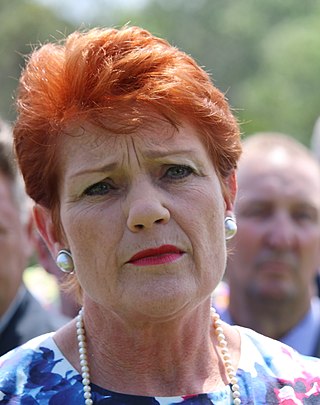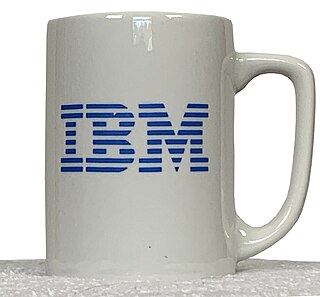Related Research Articles

Ronald Martin Popeil, was an American inventor and marketing personality, and founder of the direct response marketing company Ronco. He made appearances in infomercials for the Showtime Rotisserie and coined the phrase "Set it, and forget it!" as well as popularizing the phrase, "But wait, there's more!" on television as early as the mid-1950s.

Pauline Lee Hanson is an Australian politician who is the founder and leader of One Nation, a right-wing populist political party. Hanson has represented Queensland in the Australian Senate since the 2016 Federal Election.
An infomercial is a form of television commercial that resembles regular TV programming yet is intended to promote or sell a product, service or idea. It generally includes a toll-free telephone number or website. Most often used as a form of direct response television (DRTV), they are often program-length commercials, and are typically 28:30 or 58:30 minutes in length. Infomercials are also known as paid programming. This phenomenon started in the United States, where infomercials were typically shown overnight and early morning, outside peak prime time hours for commercial broadcasters. Some television stations chose to air infomercials as an alternative to the former practice of signing off, while other channels air infomercials 24 hours a day. Some stations also choose to air infomercials during the daytime hours, mostly on weekends, to fill in for unscheduled network or syndicated programming. By 2009, most infomercial spending in the U.S. occurred outside of the traditional overnight hours. Stations in most countries around the world have instituted similar media structures. The infomercial industry is worth over $200 billion.

Direct marketing is a form of communicating an offer, where organizations communicate directly to a pre-selected customer and supply a method for a direct response. Among practitioners, it is also known as direct response marketing. In contrast to direct marketing, advertising is more of a mass-message nature.

Merchandising is any practice which contributes to the sale of products to a retail consumer. At a retail in-store level, merchandising refers to displaying products that are for sale in a creative way that entices customers to purchase more items or products.

Flat iron steak (US), butlers' steak (UK), feather steak (UK) or oyster blade steak is a cut of steak cut with the grain from the chuck, or shoulder of the animal.
Ginsu is a brand of direct marketed knives. The brand is owned by the Douglas Quikut Division of Scott Fetzer, a Berkshire Hathaway Company. The brand was heavily promoted in the late 1970s and 1980s on U.S. television using infomercials characterized by hawker and hard sell pitch techniques. The commercials generated sales of between two and three million Ginsu sets between 1978 and 1984.
Tim Shaw is an Australian radio and television presenter, actor, journalist, author and businessman. He has hosted the 2CC the #TimShawBreakfastShow a Canberra talk radio program from 2016 to 2019. He is a Director of the National Press Club Board since November 2017 and a member of the Federal Parliamentary Press Gallery.
Arthur Schiff was one of the least known but most influential promoters of American kitsch products.

Expo Channel is an Australian home shopping infomercial channel. It is owned by parent company Direct Group Pty Ltd, a marketing and direct sales company based in the Sydney suburb of Frenches Forrest, which also owns sister channel TVSN. The channel operates by selling 'air-time' to 3rd party infomercial clients. As such unlike TVSN, EXPO does not warehouse or acquire its own products for sale.

TVSN is an Australian and New Zealand broadcast, cable television and satellite television network specialising in home shopping. It is owned by parent company Direct Group Pty Ltd, a home marketing and shopping company based in the Sydney suburb of Frenchs Forest, which also owns sister channel Expo.
aussieBum is an Australian men's swimwear and underwear manufacturer. Initially manufactured in Sydney's inner west, a growing number of aussieBum products were later manufactured overseas in China, Bangladesh, Thailand, and Vietnam. Their products are designed and delivered from Sydney, with the business run out of the company's headquarters in the suburb of Leichhardt.
Cutco Corporation, formerly Alcas Corporation, is an American company that sells cutlery, predominantly through multi-level marketing. It is the parent company of CUTCO Cutlery Corp., Vector Marketing, Ka-Bar Knives, and Schilling Forge.
Guthy-Renker is a California-based direct-response marketing company that sells health and beauty products directly to consumers through infomercials, television ads, direct mail, telemarketing, e-mail marketing, and the Internet. Many of its products are endorsed by celebrities including actresses and musicians

In marketing, a product demonstration is a promotion where a product is demonstrated to potential customers. The goal is to introduce customers to the product in hopes of getting them to purchase that item.

Timothy R. Hawthorne is a businessperson known for his expertise in direct response marketing, specializing in direct response television (DRTV). He founded Hawthorne Direct, the first advertising agency dedicated to producing infomercials. He is the author of The Complete Guide to Infomercial Marketing. He has been called "the king of the infomercial."
Philip Kives was a Canadian business executive, entrepreneur, and marketing expert from Winnipeg, Manitoba. He is best known for founding K-tel, which sold household gadgets including the Miracle Brush, Feather Touch Knife, Veg-O-Matics, as well as many compilation record albums.

The Abdominizer was an abdominal exerciser invented in 1984 by Canadian chiropractor Dennis Colonello and marketed through infomercials by the Fitness Quest corporation of Canton, Ohio, selling around six million. It was designed to protect the lower back during sit-ups.

Gold is an Australian advertorial datacasting channel that launched on 1 May 2012 by the WIN Corporation. It is available to homes in most regional WIN Television viewing areas on LCN 85. The channel broadcasts mostly infomercials, as well as education, lifestyle, community programming as well as television classics from the Crawfords library.
PriMedia Inc is a media buying and marketing firm based in Rhode Island, U.S. The company was founded by Ed Valenti and Barry Becher, and helped pioneer infomercials, the use of credit cards and 800 numbers on Television ads, and the 30-minute infomercial format on shopping channels.
References
- 1 2 "Notice of resolution Demtel International Pty Limited (In Liquidation)". Commonwealth of Australia Gazette . 29 May 2001. p. 1131. Retrieved 10 May 2024– via National Library of Australia.
- 1 2 3 4 5 6 Dennehy, Luke (8 May 2019). "Demtel salesman Tim Shaw talks his favourite infomercial and his run-in with Scott Morrison". news.com.au. Retrieved 10 May 2024.
- ↑ "Demtel International Pty Ltd ACN 002 986 165". Connectonline. Australian Securities and Investments Commission . Retrieved 10 May 2024.
- 1 2 3 4 5 6 Shoebridge, Neil (7 November 1994). "As seen on the small screen, in a store near you" . Australian Financial Review . Retrieved 10 May 2024.
- ↑ Baker Fish, Bob (29 April 2014). "Beatle Barkers: 'Dogs don't tend to hold the note when they howl'. Interview by Bob Baker Fish". Cyclic Defrost . Retrieved 10 May 2024.
- ↑ Chesterfield Evans, Jan (23 June 1988). "Demtel fined $12,000 for false advertising" . Australian Financial Review . Retrieved 10 May 2024.
- 1 2 Syvret, Paul (15 September 1994). "But wait, there's more - bad blood" . Australian Financial Review . Retrieved 10 May 2024.
- ↑ Taylor, Matt (1 September 1995). "But wait, there's more to Don Lane". Canberra Times . Canberra, ACT. p. 26. Retrieved 10 May 2024– via National Library of Australia.
- ↑ Lamberton, Hugh (29 August 1995). "Australians prefer electronic media to print: ABA survey". Canberra Times . Canberra, ACT. p. 3. Retrieved 10 May 2024– via National Library of Australia.
- ↑ Moran, Susannah (3 March 2012). "Michael Milne on $30million charge in Wickenby tax inquiry". news.com.au. Retrieved 10 May 2024.
- ↑ "Demtel man Michael Milne gets no relief". The Daily Telegraph . 1 March 2008. Retrieved 10 May 2024.
- ↑ "Revenge of the Shoppers". New Matilda. 6 December 2006. Retrieved 11 May 2024.
- ↑ Binnie, Kerrin (18 August 2010). "Bligh blasts LNP over 'Demtel' website". ABC News . Retrieved 10 May 2024.
- ↑ Pryor, Geoff (Creator) (23 December 1995). The Demtel man (none). National Library of Australia. Retrieved 10 May 2024.
- ↑ Joe Ludwig, Senator for Queensland (12 October 2006). Parliamentary Debates (Hansard) . Commonwealth of Australia: Senate. p. 11.
- ↑ Hanson, Pauline (9 March 1998). "Speech by Pauline Hanson MP to the Australian Parliament - Grievances debate". Pauline Hanson's One Nation . Retrieved 10 May 2024.
- ↑ Bowen, Nick (1 December 2013). "Goldstein shoots down top-four dreaming". AFL.com.au. Retrieved 11 May 2024.
- ↑ Shortis, Stephen (3 June 2021). "AFL top 100: The best set of steak knives ever". theroar.com.au. Retrieved 11 May 2024.
- ↑ Gabelich, Josh (14 July 2018). "Collingwood's Jack Crisp is the trade steak knife that has become a genuine gun". Fox Footy . Retrieved 11 May 2024.
- ↑ Gabelich, Josh (27 December 2018). "Why new Melbourne recruit Kade Kolodjashnij is far from a set of steak knives". Fox Footy . Retrieved 11 May 2024.